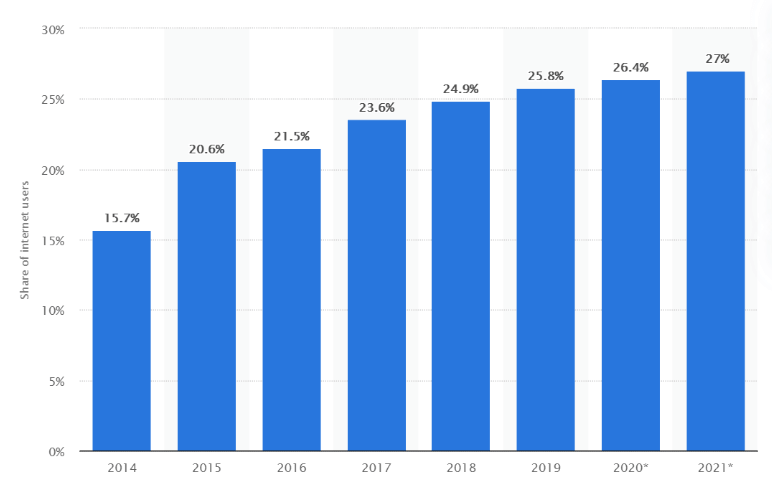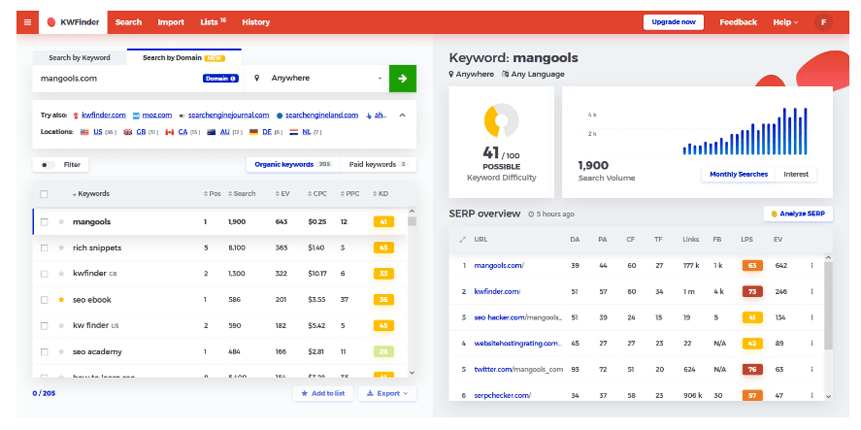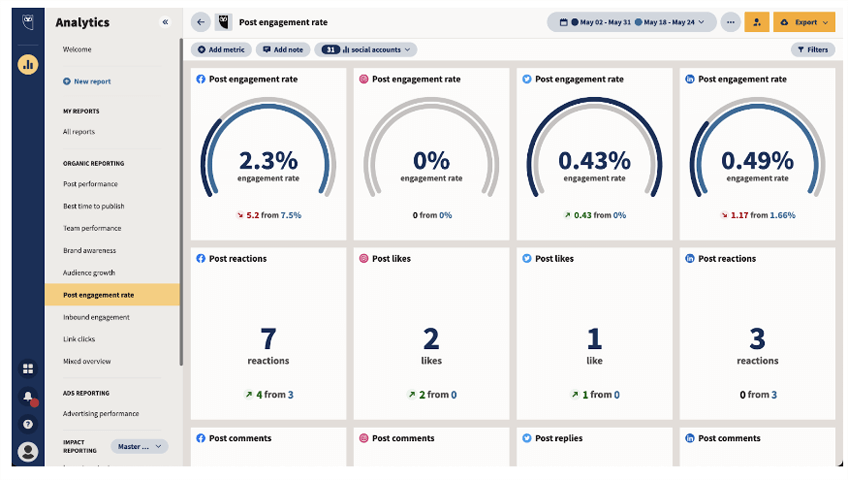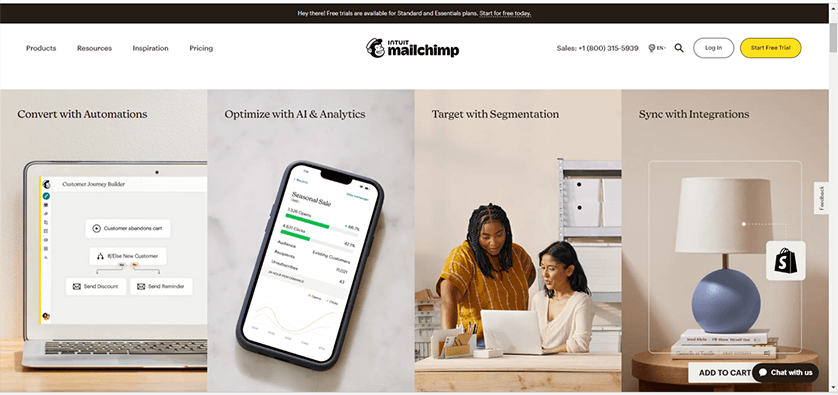
Click the button to start reading
Crush Your Competition: A Guide to Digital Marketing for Startups
Even if you’re starting with a small budget, you can build a strong online presence.
Running a startup can feel exciting and terrifying at the same time. You have a vision, a product, a team, and the grit to make it happen. But what’s next? How do you get heard in a sea of similar-sounding startups?
Enter digital marketing. With its power to leverage digital platforms, you can get your startup in front of the right people — every time, all the time.
But digital marketing isn’t just about throwing spaghetti at the wall and seeing what sticks. It’s about finding a unique recipe that your target audience is in love with.
That’s where we come in. We’ll help you put together a working digital marketing plan that’ll make your startup stand out in a crowded market. We’ll explore why digital marketing is important for startups, share practical tips, and present the best digital marketing tools for startups.

Benefits of digital marketing for startups
Digital marketing is a powerful tool. Without a doubt, it can help you grow your business in an efficient and measurable way. Let’s look into the major advantages of digital marketing for startups:
1. Save your money.
Digital marketing is an affordable alternative to TV ads, radio ads, and billboards. Just think of it. You get the chance to reach a large audience with a smaller budget. The single requirement? You simply need to craft targeted and well-planned marketing campaigns.
2. Target like a pro.
Digital marketing gives flexibility. It allows startups to focus on specific demographics and audiences through various channels like social media, search engines, and email marketing. As a result, you’re able to reach the right people with your products or services.
Moreover, you can use data to personalize your offers. For instance, based on your prior interactions with a user, you can choose to greet them with targeted offers. Be it in their inbox or on your website.
3. Get data-driven insights.
Looking for ways to make evidence-based decisions? Need trackable results?
The next reason why digital marketing is important for startups is that it provides you with measurable results. You can monitor the progress of campaigns and fine-tune your strategies.
Use web analytics and other online metric tools to learn how effective your campaign has been. This way, you can know how customers use your website or respond to your advertising.
4. Convert your visitors into customers.
Having a website means your customers are just a few clicks away from converting, unlike traditional media that requires customers to make a phone call or visit a physical store. With digital marketing, the purchasing process becomes seamless and immediate.
5. Go global with ease.
The importance of digital marketing for startups is determined by its ability to increase brand awareness. And not only locally.
When you create engaging content, you build social media presence and improve your search engine rankings. For only a small investment, your website and social media pages can open doors to new markets globally!

Disadvantages of digital marketing
Get real. See the digital marketing landscape clearly before making decisions. To help you with this, let’s look into the downsides and challenges that may affect digital marketing for startups:
1. Specialized skills and knowledge are required.
To achieve success in digital marketing, it’s essential to ensure that your team has the appropriate knowledge and expertise.
The tools, platforms, and trends are constantly evolving, so it’s crucial to keep up-to-date with the latest developments. Be prepared to assess your team’s training needs and implement effective training programs to stay on top of your game.
2. Fierce competition makes it hard to stand out.
Digital marketing enables you to reach a worldwide audience, but it also means facing stiff competition on a global scale. Standing out among powerful competitors can be a real challenge. And grabbing consumers’ attention in the sea of online messages is a tough call, too.
3. Handling feedback and complaints can be difficult.
Your audience may come across negative feedback and critiques of your brand on social media platforms or review websites. If you fail to respond adequately or address concerns in a timely manner, it can harm your brand reputation.
4. Security and privacy risks exist.
Collecting customer data and using it for digital marketing purposes entail legal considerations. Complying with the regulations and rules surrounding privacy and data protection is essential to protect your brand’s reputation. Plus, it directly affects your efforts to maintain consumers’ trust.
5. Ad-blockers limit digital marketing reach.
The effectiveness of online advertising is being impacted by the widespread use of ad-blocking applications and add-ons.
While these tools were unknown to the majority of users a decade ago, nowadays, a larger proportion of consumers are familiar with them. And their popularity is on the rise! To demonstrate, below is the distribution of ad blockers in the US from 2014 to 2021.

Image source: Statista

What are the best digital marketing strategies for startups?
There is no one-size-fits-all answer to this question. Why? Because the best digital marketing strategies can vary depending on the industry, target audience, and business goals.
However, we’ve handpicked eight effective digital marketing strategies for startups to help you get your business off the ground:
Strategy #1: Building a strong online presence
To begin, establish your brand’s identity by defining its mission, values, target audience, and unique selling proposition (USP). This will help you create a consistent brand message across all your online channels.
- Your website is your business card. Next, develop a website. Your website is the foundation of your online presence, so make sure it’s well-designed, easy to navigate, and optimized for search engines. Include a blog and other useful content to engage your audience and showcase your expertise.
- Leverage social media. Choose the social media platforms that suit best to your audience and industry and create a consistent presence across them.
Strategy #2: Search engine optimization (SEO)
SEO encompasses the practice of enhancing your website and content to achieve a higher ranking on search engine results pages (SERPs). With a few steps, you can effectively plan, coordinate and monitor SEO projects. Let’s cover the essential stages involved:
- Perform keyword research by utilizing keyword research tools to find the words and phrases that your prospects are searching for. Prioritize long-tail keywords specific to your industry.
- Optimize your website: Optimize your website by including your target keywords in your content, headers, title tags, and meta descriptions. Make sure your website is quick to load and easy to navigate.
- Build backlinks: These are links from other websites to your website, and they’re a key factor in SEO. Create valuable content that other websites will find worth linking to in order to build backlinks. Moreover, have a plan for reaching out to relevant websites and asking for links.
- Use local SEO tactics: If your business has a physical location, use local SEO tactics to show up in local search results. Claim your business on Google My Business, optimize your website for local keywords, and get listed in local directories.
- Monitor and adjust your strategy: Use analytics tools to monitor your website traffic, keyword rankings, and other metrics. Adjust your SEO strategy based on the received data and continually improve your website’s search engine visibility.
Strategy #3: Pay-per-click advertising (PPC advertising)
First, let’s define PPC. It’s when you place ads on search engines, social media platforms or other websites and pay for each click on the ad. This helps your ads show up in relevant search results and increase your visibility.
When it comes to PPC advertising, one of the most well-known examples is on search engines. These platforms offer various ad types, including text and shopping ads, that can be purchased to appear in different sections of the search results.

Here’s how to plan your PPC campaigns:
- Create engaging ad copy: Your ad copy should be clear, concise, and engaging. Use attention-grabbing headlines, highlight your unique selling proposition, and include a strong call to action to encourage clicks.
- Target specific demographics: Need to target people of specific age, gender, location or interests? Employ PPC advertising to reach your desired demographics. This can help you target audiences more effectively and increase your chances of converting them into customers.
- Leverage ad extensions to add supplementary information, such as your phone number, location, and website link, to your ads. This can make your ads more informative and attractive to potential customers.
Strategy #4: Content marketing
Content marketing isn’t just a tactic or a buzzword. It’s a continuous process of building trust, credibility, and relationships with your target audience. Here’s how:
- Know your audience: Before creating any content, it’s important to understand your target audience. Who are they? What are their needs, pain points, and interests? What kind of content do they prefer? Once you know the answers to these questions, you can create content that appeals to them and provides value.
- Provide value: Valuable content will take you a long way. This can be in the form of information, education, inspiration, or entertainment. Simply ensure that your content is well-researched, unique, and engaging.
- Use visuals: Visual content, such as images and videos, makes your content more memorable. Plus, high-quality visuals effectively amplify your message and help you get your point through faster.
- Experiment with different formats: Don’t be afraid to experiment with different formats and styles of content. This could include long-form articles, listicles, how-to guides, case studies, and more. In addition to written content, consider creating multimedia content, such as videos, podcasts, and infographics. This can help to diversify your content and reach a wider audience.
Strategy #5: Email marketing
As David Newman put it, “Email has an ability many channels don’t: creating valuable, personal touches – at scale.” So, you can’t overlook the benefits email marketing can bring to your digital marketing efforts.
- Build a high-quality email list to maximize the effectiveness of your email marketing efforts. This entails gathering email addresses from individuals who are genuinely interested in your products. One way to accomplish this is by offering freebies, such as eBooks or webinars, in exchange for email addresses.
- Segment your email list based on subscribers’ interests and behaviors. This approach enables you to send personalized, targeted messages that speak to your readers’ hearts and minds.
- Use catchy subject lines: What’s the first thing you see in your emails upon receiving them? Correct! The subject line. Remember, it’s important to open a conversation loop with your subject lines (a loop that gets closed only after reading the email). Use action-oriented language and create a sense of urgency to encourage people to open your email.
Strategy #6: Social media marketing (SMM)
According to a survey by Adobe, both Gen Z and Millenials are almost equally open to content and ads shared through social platforms. By the way, over half of the surveyed Millennials expressed their willingness for brands to interact with them on social media channels.
Social media marketing involves the following steps:
- Choose the right social media platforms: Consider the unique characteristics of each social media platform and select the ones that are best suited for your brand. For example, if you’re targeting B2B professionals, LinkedIn will be more effective than platforms like TikTok and Instagram.
- Find your unique voice: Your social media presence should reflect your brand’s personality and values. Therefore, develop a strong brand voice that resonates with your target audience and use it consistently across all channels.
- Prioritize quality over quantity: Social media users are bombarded with content, so it’s important to post high-quality content that stands out. This could include original content, such as blog posts and infographics, as well as curated content from other sources.
- Engage with your audience: Social media is a two-way conversation, so you should engage with your audience by responding to comments and messages. Be prompt, polite, and playful. As a result, you’ll build a strong, loyal following that leads to increased brand awareness and sales.
Strategy #7: Influencer marketing and community marketing
Take this example. Peloton, an online fitness class company, has become a household name thanks to its smart digital marketing campaigns.
The company effectively uses influencer partnerships to reach its audience and build brand awareness. Markedly, it relies on its instructors to promote the brand across many personal social channels. The instructors play a crucial role as brand ambassadors, as Peloton frequently showcases them on its social channels and features them in advertising campaigns.
By leveraging its instructors’ personal brands, Peloton gives a good example of how to incorporate influencer and community marketing into digital marketing for startups:
- Identify relevant influencers: The first step in using influencer marketing is to identify the people who are most relevant to your brand and target audience. Look for those who have a large following in your niche or industry. Don’t forget to make sure that their values and voice align with your brand.
- Develop a relationship with influencers: Once you’ve identified relevant influencers, start developing a relationship with them. Connect with them on social media, interact with their content, and initiate communication to introduce your brand and yourself.
- Set clear goals and expectations: Before working with influencers, set clear goals and expectations for the campaign. This could include metrics like reach, engagement, and conversions, as well as guidelines for how the influencer should promote your brand.
Strategy #8: Affiliate marketing
If influencer marketing is about leveraging the reach and influence of popular personalities to promote your brand, affiliate marketing is about building a network of affiliates who promote your products in exchange for a commission or incentive.
To explain, affiliate marketing focuses on building mutually beneficial relationships with businesses who have a vested interest in driving sales for your business. Rather than a one-time promotional effort, affiliate marketing is a long-term partnership that can help you enhance your reach, increase conversions, and grow your business.
Here’s how to get affiliate marketing right:
- Choose the right affiliates: It’s important to choose affiliates that are relevant to your niche or industry and have a large following or audience. Plus, you should consider factors such as their website traffic, engagement rates, and reputation.
- Develop a relationship with your affiliates: Building strong relationships with your affiliates is key to a successful affiliate marketing campaign. Reach out to them, introduce yourself and your brand, and work together to develop a campaign that’s mutually beneficial.
- Provide attractive incentives: To motivate your affiliates to promote your brand, provide incentives such as commission rates, bonuses, and offers for their audience.

Sticking to your budget: Affordable digital marketing for startups
All the above strategies are powerful and useful. But how to do digital marketing for startups without breaking the bank and still generate results?
Next, let’s look into some affordable digital marketing strategies that startups can add to their digital marketing plan:
1. Write guest blog posts on relevant websites.
One cost-effective marketing strategy to broaden your reach and deliver value to a new audience is guest blogging. This involves reaching out to bloggers within your industry and proposing a relevant topic for a guest post.
If accepted, your article will be published on their website, exposing your brand to a new audience. A high-quality post has the potential to generate significant traffic to your site in a short period, making it a powerful tool in your marketing arsenal.
2. Create infographics to distribute online.
Create eye-catching infographics about relevant topics and share them online to increase brand visibility. Infographics are highly shareable, making them a great tool for expanding your reach and engaging with your audience.
3. Use Reddit or Quora to get attention for your brand.
These two sites are filled with crowd-sourced questions and answers. So, they’re ideal for engaging in conversations and answering questions related to your expertise.
While answering questions, showcase your expertise in your industry or niche. By consistently providing value to the community, you establish yourself as a thought leader and enhance your brand’s credibility. Don’t forget to use your brand name or website as a source of information.
Last but not least, avoid spamming or self-promotion on these platforms. Instead, focus on building relationships with the community. If you have something relevant to share, do so in a way that’s informative and adds value to the conversation.
4. Repurpose your existing content.
Repurposing content involves taking an existing piece of material and presenting it in a new format to reach a different audience.
For example, suppose you have a blog post on “Top 10 Tips for Healthier Eating.” In that case, you could transform it into a visually appealing infographic and share it on social media platforms to attract a wider audience. By doing so, you can expand your brand’s reach and awareness significantly.
To get started, take stock of your existing content and look for ways to repackage it creatively. Repurposing content can save you time and resources while maximizing the value of your content assets. By using a combination of text, images, videos, and other media, you can engage with diverse audience segments and generate new leads and traffic to your site.

How to create a digital marketing plan for startups
Creating an online marketing plan for a startup requires a clear understanding of your prospects, goals, and available resources.
By following these eight essential steps, you can create a plan that helps your startup grow and succeed.
Step 1: Define your target audience.
Identify who your ideal customer is and what their interests and needs are. For example, Glossier, a beauty brand, targeted a specific segment with its “Skin First, Makeup Second” campaign on Instagram. Notably, the campaign centered on promoting natural beauty and helped the brand capture a devoted following of trendsetting young customers who prioritize a healthy, unfiltered appearance.
Step 2: Set your goals.
Before rushing to execution, determine the goals of your digital marketing plan. What are the primary and secondary goals of your online marketing plan? Do you need to increase website traffic, generate leads or increase sales?
Step 3: Conduct market research.
You don’t need to reinvent the wheel. Therefore, analyze your industry and competitors to identify trends and best practices.
Step 4: Choose your digital marketing channels.
Consider which digital marketing channels will be most rewarding for reaching your target audience (such as email marketing or social media).
Step 5: Develop your content strategy.
Create a content calendar that specifies the type of content you’ll produce, how often you’ll publish it, and where it’ll be published.
Step 6: Establish your brand voice and tone.
Determine how you want to interact with your audience and establish your brand personality. Create your brand story and be a hard-to-resist storyteller.
Step 7: Create a budget.
Determine how much you can spend on your online marketing efforts and allocate your budget accordingly.
Step 8: Measure your results.
Never overlook the importance of this step. Surely, there’s no improvement without proper measurement. Track your progress towards your goals and make adjustments as needed.

Start smart and scale with ease Digital marketing tips for startups
Seek out media coverage: Pitch your startup to local or industry-specific publications, bloggers, or podcasts to generate buzz and gain exposure.
Network and attend events: Connect with potential customers, partners, and investors by attending industry conferences and participating in networking events.
Comment on posts of famous personalities: Be “visible” on social networks and join hot conversations by sharing interesting content. As a result, you’ll create brand recognition and attract potential customers.
Focus on a niche audience: Understand the needs and preferences of a smaller, targeted audience. Without a doubt, it’s the best shortcut to creating digital marketing campaigns that resonate with your audience and stand out from larger corporations.
Focus on customer service: Prioritize exceptional customer service to build trust and loyalty with customers online. If you want to turn customers into promoters of your brand, provide support for a long time after they make a purchase.
Consistency is key: Set a posting schedule and stick to it on social media to generate a loyal following and keep your audience engaged.
“Steal” traffic from competitors: Study your direct competitors and come up with ways to “steal” their traffic using paid ads and alternative landing pages.
Embrace innovation: Stay up-to-date on emerging trends and technologies. Indeed, this will help you differentiate yourself from larger corporations and create unique campaigns.
Take your business to the next level: The best digital marketing tools for startups
Digital marketing requires effort and resources.
You need to invest in the right software and platforms to execute your digital marketing strategy effectively. Also, you need to create high-quality, SEO-optimized content and engage with your target audience.
There are essential digital marketing tools available for startups, but here are the best ones that can help you ace your digital marketing game:
Google Analytics

Google Analytics is a free tool to help startups track website traffic, visitor behavior, and other key metrics.
To explain, it can provide valuable insights into how well your website is performing, including page load times and bounce rates. Plus, you can set up conversion tracking to measure specific actions on your website, such as purchases or form submissions.
SEMrush

SEMrush is an all-in-one marketing toolkit that can help startups with a range of tasks. These include SEO (search engine optimization), PPC (pay-per-click) advertising, content marketing, and social media marketing, to name just a few.
What’s more, SEMrush offers valuable features like keyword research, backlink analysis, and competitor analysis.
KW Finder

KWFinder is an affordable keyword research tool that can be incredibly useful for digital marketing, especially for startups.
Use KWFinder to find the right keywords to optimize your website, blog or social media content. Simply enter a keyword, and KWFinder will generate a list of keywords with their search volume and estimated cost per click (CPC). This can help you identify high-traffic, low-competition keywords to target in your digital marketing plan.
In addition, KWFinder lets you analyze your competition by showing you the top search results for any given keyword, along with their domain authority, page authority, and backlink profile. By using this information, you can understand what it takes to rank higher than your competitors and identify any gaps or opportunities in your digital marketing strategy.
Hootsuite

Hootsuite is an effective social media management tool for managing your social media accounts in one place. It offers features like scheduling posts, monitoring social media mentions, and analyzing social media performance.
To make your life easier, Hootsuite allows you to collaborate with team members, enabling multiple people to manage your social media accounts and streamline your workflow.
Mailchimp

Mailchimp is a well-known email marketing platform that can help startups create and send email campaigns to their subscribers. It offers features like automation, A/B testing, and analytics.
Moreover, Mailchimp provides tools to manage your email subscribers, including segmentation and tagging, allowing you to target specific groups with relevant content.
Canva

Canva is a sophisticated graphic design tool to create high-quality graphics for your digital marketing campaigns. It offers a range of templates and design elements, so you’ll surely find the one that suits your brand.
With Canva, digital marketing for startups is made so much easier. It allows you to create professional-looking social media posts, blog graphics, email newsletters, and more.
Also, Canva is a great tool for building professional-looking presentations for your startup. You can design slides with images, graphs, and text to showcase your startup’s products or services.
Hotjar

Hotjar is a user feedback and behavior tracking tool that can help startups understand how users interact with their website. It offers features like heat maps, user recordings, and feedback polls.
Thus, Hotjar’s heatmaps allow you to see where website visitors are clicking, scrolling, and spending the most time on your website. This can help you identify which areas of your website are getting the most attention, which can help you optimize your website for improved engagement and conversion rates.
Teamly

Teamly is a user-friendly project management tool to help you organize and manage your digital marketing efforts effectively.
You can create a separate project for each digital marketing campaign you’re running, such as a social media campaign, email marketing campaign, or content marketing campaign.
Secondly, you can set up tasks and deadlines for each team member within each project. Quite easily, everyone knows what they need to do and when the tasks are due.
Next, you can divvy up the work and keep track of everyone’s progress.
Aside from task management features, Teamly also enables collaboration with team members. Use this digital marketing tool for startups to communicate and collaborate on tasks quickly and effectively. For better impact, make online conversations visual through screenshots and screen recordings.
Your key takeaway
Digital marketing has the potential to work wonders for your startup. By tapping into its power, you can optimize your content, boost your search engine rankings, and drive more sales to your business.
Too many challenges? Need help? Pick the right strategies to overcome road bumps easily. And don’t forget to use digital marketing tools for startups to make your business a roaring success!
















